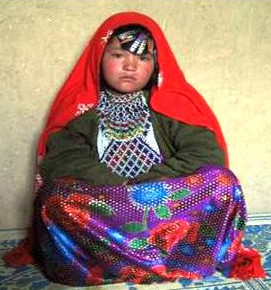Killid Group, October 7, 2012
Married before they finish school
...early marriage is illegal but girls are married off between 13 and 17 years, and pregnant between 17 and 19 years
By Abida M. Telaee
Underage marriages may be behind the high mortality figures for women. An overwhelming number of girls are deprived of the right to education and a childhood.
Sadia Fayeq Ayubi, head of the reproductive health department in the Ministry of Public Health says early marriage is illegal but girls are married off between 13 and 17 years, and pregnant between 17 and 19 years. "Conditions for life in our country are poor. People are economically poor, and undernourished," she explains. Anemia, the result of poor eating, is a serious problem during pregnancy, Ayubi adds.
Dr Hafiza Omarkhail, head physician of Malalai Maternity Hospital in Kabul identifies Fistula as a rampant female problem. "Pregnant women who are living in remote rural areas and don't have access to health service are at risk," she says. Obstetric fistula is a childbirth injury because of lack of medical help. Complications during childbirth create a hole between the birth passage and an internal organ like the rectum leading to incontinence. The woman cannot hold her urine and sometimes bowel movement. Her baby is unlikely to survive. The woman is likely to be rejected by her husband because she cannot bear any more children.
Nayela from Sarpol province is in Malalai Hospital for treatment of fistula. She had lost her father in childhood and her grandfather had made her marry a 40-year-old man for the sake of money.
When she was having her first child, her condition was very serious. Her child was born dead, and she suffered serious internal injury. Nayela's husband and mother-in-law drove her out of the house because she was a woman with fistula. Her mother has brought her to the hospital in Kabul for its treatment, which involves surgery.
Worst in the world

An 8-year old child bride in Afghanistan was sold to a policeman for cash. Full Story ( http://vinienco.com/2011/10/07/afghan-policemen-buys-eight-year-old-bride/ )
One in fifty Afghan women are likely to die of pregnancy-related causes in her lifetime, according to the Afghanistan Mortality Survey in 2010. The lifetime risk of pregnancy-related death is five times as high in rural areas as it is in towns and cities. But the survey's maternal mortality rate of 327 per 100,000 live births in the survey area (which excluded parts of the country disrupted by conflict) is significantly lower than the 1,400 assigned by the UN agencies and World Bank for the same year.
Parwin Rahimi in charge of Women's Support Department at AIHRC (Afghanistan Independent Human Rights Commission) says rates of divorce, suicide and self-immolation are increasing among women. At 16, the legal age of marriage under Afghan civil law, teenage brides face exploitation and unimaginable violence. "How come civil law allows a 16-year-old girl to get married and start a family? We believe this is a flaw in the law," Rahimi says. Most women have no access to justice and become victims of violence, she adds.
Girls are coerced into marrying young. It is a matter of shame for a family if a daughter is not married by 16 years. Girls are also traded in marriage to save family honour or in compensation for a crime committed against a member of the family she's being married into.
Stolen childhood
High rate of child marriages are also a reason for the high drop out rate. According to the Ministry of Education, there are no high school students in 200 districts as a result of underage marriages. Afghan girls rarely manage to finish school, particularly in rural areas.
Mahjooba who is 19 years old was engaged to her aunt's son in childhood. When she refused to marry him, the family got violent. "I had continued my studies up to 9th class. I passed an exam for admission to nursing school. When my aunt's family got to know, they did not want me to continue with my studies. But I did not agree to their decision. I was divorced," she says.
Nazia Faizi of the Rights Department in the Ministry of Women's Affairs says that 53 child marriages have been reported this year. However, the number is less than previous years, she clarifies. "There are more unreported cases in the rural areas where women are more deprived. They have no rights and no access to legal help," she explains.
According to Nazia Faizi, child marriages are most common in four provinces: Kunduz, Sarpol, Faryab and Herat. "Here access to justice for women is poor," she says.
The Shariah permits post-pubescent marriage. Sayed Salahudin Hashimi, the preacher in Abu Bakr Siddiq Mosque in Khair Khana, Kabul, says when a girl reaches the age of maturity she can decide herself if she is ready for marriage. She cannot be forced, and she has the right to reject marriage.
Is there a way of controlling child marriage? Afghanistan's Independent Human Rights organisation, AIHRC, has been pushing for the registration of marriage in court as a solution to child marriages.
Characters Count: 5687
